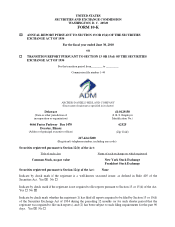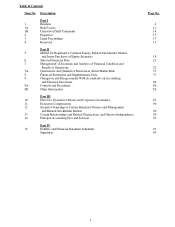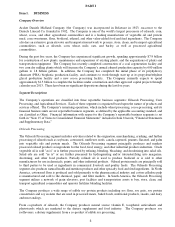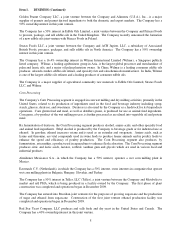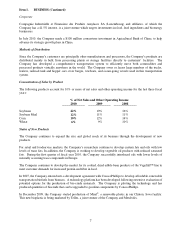Archer Daniels Midland 2010 Annual Report Download - page 15
Download and view the complete annual report
Please find page 15 of the 2010 Archer Daniels Midland annual report below. You can navigate through the pages in the report by either clicking on the pages listed below, or by using the keyword search tool below to find specific information within the annual report.11
Item 1.
BUSINESS (Continued)
The public may read and copy any materials filed by the Company with the SEC at the SEC‘s Public Reference
Room at 100 F Street, N.E., Washington, D.C. 20549. The public may obtain information on the operation of the
Public Reference Room by calling the SEC at 1-800-SEC-0330. The SEC maintains an Internet site which
contains reports, proxy and information statements, and other information regarding issuers that file information
electronically with the SEC. The SEC‘s Internet address is http://www.sec.gov.
Item 1A.
RISK FACTORS
The availability and prices of the agricultural commodities and agricultural commodity products the Company
procures, transports, stores, processes, and merchandises can be affected by weather conditions, disease,
government programs, competition, and various other factors beyond the Company’s control and could
adversely affect the Company’s operating results.
The availability and prices of agricultural commodities are subject to wide fluctuations due to factors such as
changes in weather conditions, disease, plantings, government programs and policies, competition, changes in
global demand resulting from population growth and changes in standards of living, and global production of
similar and competitive crops. These factors have historically caused volatility in agricultural commodity prices
and, consequently, in the Company‘s operating results. Reduced supply of agricultural commodities due to
weather-related factors or other reasons could adversely affect the Company‘s profitability by increasing the cost of
raw materials and/or limit the Company‘s ability to procure, transport, store, process, and merchandise agricultural
commodities in an efficient manner.
The Company has significant competition in the markets in which it operates.
The Company faces significant competition in each of its businesses and has numerous competitors. Pricing of the
Company‘s products is partly dependent upon industry processing capacity, which is impacted by competitor
actions to bring on-line idled capacity or build new production capacity. Many of the products bought and sold by
the Company are global commodities or are derived from global commodities. The markets for global
commodities are highly price competitive and in many cases the commodities are subject to substitution. To
compete effectively, the Company focuses on improving efficiency in its production and distribution operations,
developing and maintaining appropriate market share, and providing high levels of customer service. Competition
could increase the Company‘s costs to purchase raw materials, lower selling prices of its products, or reduce the
Company‘s market share, which may result in lower and more inefficient operating rates. If the Company is unable
to compete on price, service, or other factors, it could have an adverse effect on its operating results.
Fluctuations in energy prices could adversely affect the Company’s operating results.
The Company‘s operating costs and the selling prices of certain finished products are sensitive to changes in energy
prices. The Company‘s processing plants are powered principally by electricity, natural gas, and coal. The
Company‘s transportation operations are dependent upon diesel fuel and other petroleum-based products.
Significant increases in the cost of these items, including any consequences of regulation or taxation of greenhouse
gases, could adversely affect the Company‘s production costs and operating results.
The Company has certain finished products, such as ethanol and biodiesel, which are closely related to, or may be
substituted for, petroleum products. Therefore, the selling prices of ethanol and biodiesel can be impacted by the
selling prices of gasoline and diesel fuel. A significant decrease in the price of gasoline or diesel fuel could result
in a significant decrease in the selling price of the Company‘s ethanol and biodiesel and could adversely affect the
Company‘s revenues and operating results.


